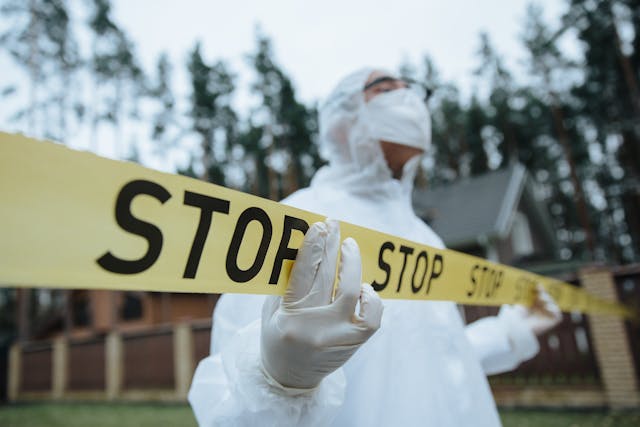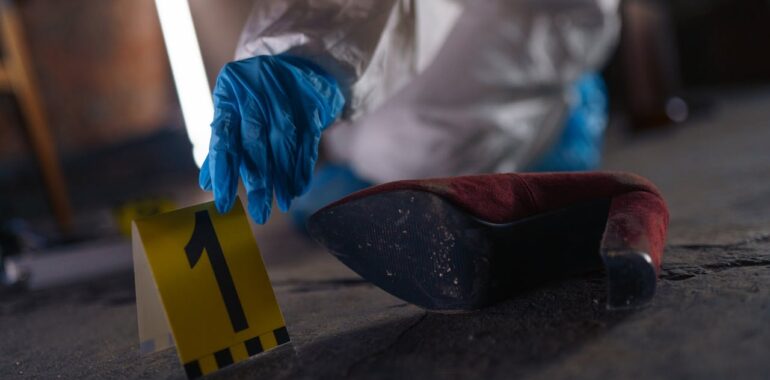Key takeaways
- Crime scene technicians play a crucial role in criminal investigations and justice implementation.
- This is a highly specialized skill that is a part of the foundation of the justice system.
- Due to the seriousness and integrity of the job, there are many crucial crime scene technician qualifications necessary to complete.
- The answer to “how to become a crime scene technician” includes completion of educational requirements such as certifications and bachelor’s degrees, and getting necessary training.
- There are more than one academic path you can choose to become eligible for a job in crime scene technician and forensics.
- Top bachelor degrees for becoming a crime scene technician include a bachelor’s degree in criminal justice, a bachelor’s degree in criminal justice administration, and bachelor’s in forensics.
One of the most prestigious job roles and positions you will find in the criminal justice and law enforcement field is crime scene technician. These specialists are highly responsible for escalating a crime investigation, making them a backbone for most criminal cases and proper implementation of justice.
Crime scene technicians are specialized professionals who play a key role in not only investigating the crime scene but also gathering evidence and analyzing it thoroughly. They can provide irreplaceable and valuable insights into the crime and offer a lot of depth and understanding to investigators.
Moreover, some people may refer to crime scene technicians as forensic technicians and evidence technicians. Regardless of what you call them, the core of their job function remains the same and just as valuable. So, if you are wondering how to become a crime scene technician”, you have come to the right article.
A crime scene technician is a skilled and laser-focused job role that requires years of education and training. Therefore, it is important that you explore all the necessary requirements for becoming a crime scene technician. So, in this article, we look at different paths – including bachelor’s degrees, certifications, and other requirements – to help you plan your career ahead. Let’s dig in!
How to become a crime scene technician?

Many young people are often fascinated by the idea of solving mind-boggling criminal cases. If you are one of them, becoming a crime scene investigator technician might be the right choice for you. However, a big question looms over – how to become a crime scene technician. In this section, we look at different ways that allow you to build a successful career in this field.
Certifications
To become a crime scene technician, there are certain skills and competencies you must possess. These may include, but not limited to, specialized skills such as fingerprint analysis, photography at crime scenes, and even collaboration and teamwork. So, to gain these specialized skills, many people opt for certifications.
In particular, certifications demonstrate your expertise and can improve your job prospects. There are several types and levels of certifications. Some of the most popular ones include:
- Crime Scene Certification by International Association for Identification
- Bloodstain Pattern Analyst Certification
- Certifications from American Board of Criminalistics
However, keep in mind that certifications are not always required by employers. Yet, they can make you more employable and appealing to potential employers. Certifications are an excellent badge to add to your profile.
Training
Just like certifications, specialized training is also a great way to enhance your chances at becoming a crime scene technician. Ideally, the core difference between training and certification is in terms of the practical experience. Most of the certifications are based on theoretical learning, typically through a mix of coursework that includes case studies and mentors. However, training can be more rigorous, hands-on, and focus on learning by working.
Moreover, many college graduates, as well as practicing professionals in the field are required to undergo training for refreshing concepts as well as learning new things. With advancing technologies, new methods are always coming into the criminal justice field. Therefore, training helps you learn things that a bachelor’s degree could not cover.
Furthermore, specialized training often covers various aspects, including non-technical aspects such as empathy and sensitivity training, ethical aspects, and so on. The core focus of most of the technical trainings includes:
- Learning how to piece together events based on evidence and scene analysis
- Ensuring evidence integrity through proper collection and storage techniques
- Training in areas like DNA analysis, forensic toxicology, and ballistic testing
- Simulated scenarios that help trainees practice collecting and analyzing evidence
Bachelor degrees
Criminal justice, criminology, criminal justice administration, and many other such bachelor programs are very popular. Many young students are intrigued by crime and the justice system and wish to become change-makers by opting for such college majors.
In addition to this, you will also see that most of the employers in this field require a minimum of a bachelor’s degree. A report by BLS tells us that the typical entry-level crime scene technician requirements include not only certifications and training but also a bachelor’s-level degree.
Furthermore, having a bachelor’s degree will be truly beneficial for you. For example, if you opt for a criminal justice major, you will have a broad understanding of the criminal justice system, making it ideal for you to transition into other areas of law enforcement. Furthermore, specific degrees such as a bachelor’s degree in forensic technician, or accounting, are also an excellent way of getting all the educational requirements fulfilled.
Some of the most important benefits of getting a bachelor’s degree for becoming a crime scene technician include:
- Get both technical and theoretical knowledge that applies to real-life situations
- Broad understanding of other processes attached and liked to crime scene technicians
- Foster numerous professional and personal skills
- Wider career options allowing to explore other opportunities too
- Needed for finding work in labs and specialized facilities
- Access to high-knowledge academic resources through campus facilities
- Access to professionals and like-minded individuals from the industry
- Get specialized and dedicated mentorship
We discuss the different options of bachelor degrees in detail below!
What degree do I need to become a crime scene technician?

So, now we come to another important question. To answer “how to become a crime scene technician”, we must explore all the options available. A bachelor’s degree in forensics is perhaps the ideal way to go, but there are so many alternatives that you can also check out.
For starters, keep in mind some important considerations when choosing any college for your bachelor degree:
- Cost of attendance and financial aid
- Faculty qualifications
- Alumni success rate
- College and program accreditations
- College facilities such as labs
Finally, here is an overview of the different degrees and college majors you can choose to become a crime scene technician:
Bachelor’s degree in criminal justice
Firstly, a highly recommended college major is criminal justice. You will find many schools and colleges in the USA offering bachelor of science or bachelor of arts in this field. Furthermore, this degree is known to provide a broader and deeper understanding of the legal and investigative processes involved in solving crimes. Moreover, programs typically focus on multiple aspects of crime, such as criminology, evidence collection, law enforcement practices, and crime scene procedures.
In addition to this, many amazing colleges in New York for criminal justice offer state-of-the-art facilities that make students eligible for serious and practical jobs. John Jay, for example, emphasizes both theoretical knowledge and practical skills, with access to cutting-edge labs and expert faculty.
Bachelor’s degree in forensics
Secondly, we have the option to pursue a degree in forensics. This is laser-focused and lays emphasis on job roles in crime scene investigation and evidence management. Furthermore, the typical curriculum in a forensics program includes courses on toxicology, forensic biology, crime scene photography, and criminalistics. Some of the most renowned colleges for a bachelor’s degree in forensics include the Pennsylvania State University and the University of New Haven.
Most importantly, good bachelor programs in this field focus thoroughly on hands-on learning. Therefore, they use coursework such as mock situations, simulations, and mock crime scenes to enhance the learning experience. Lastly, a degree in forensics is ideal for those who want to focus on the scientific aspect of evidence collection and analysis.
Bachelor’s degree in criminal justice administration
Lastly, we have the option to pursue a degree in criminal justice administration. Keep in mind that a bachelor’s degree in criminal justice administration is different than CJ. in this degree, the core focus is on core criminal justice concepts with management and administrative training. Therefore, it is ideal for individuals aspiring to leadership roles within law enforcement or forensic teams. Furthermore, the program typically covers topics such as criminal law, organizational behavior, and resource management.
In addition to this, you will find most of the colleges offering forensic science and technician courses and subjects included in the curriculum. Therefore, it offers a well-rounded exposure to this highly specialized field. Lastly, some of the most popular schools offering a bachelor’s degree in criminal justice administration include Michigan State University.
Conclusion – how to become a crime scene technician?
In conclusion, the right career guidance and advice are crucial for making informed decisions in your college journey. Without the right assistance, you might not choose the ideal academic majors. Therefore, to answer the question “how to be a crime scene technician”, you must ponder over the above-mentioned educational aspects such as certifications and bachelor degrees. These are irreplaceable and allow you to stay ahead in the industry and always have an edge. Lastly, there are several options for those who want to pursue a bachelor’s degree to become a crime scene technician. The options include a bachelor’s degree in criminal justice, a bachelor’s degree in forensics, and bachelors degree in criminal justice administration.
